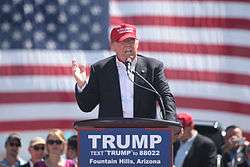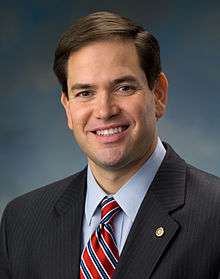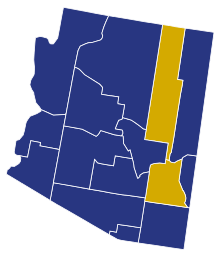Arizona Republican primary, 2016
| | |||||||||||||||||||||||||||||||||||||||||||||||||||||
| |||||||||||||||||||||||||||||||||||||||||||||||||||||
| |||||||||||||||||||||||||||||||||||||||||||||||||||||
|
| |||||||||||||||||||||||||||||||||||||||||||||||||||||
| Election results by county. Donald J. Trump
Ted Cruz | |||||||||||||||||||||||||||||||||||||||||||||||||||||
The Arizona Republican Primary was held on March 22, 2016, dubbed "Western Tuesday" by media. The primary was held on the same say as the Utah Republican caucus, as well as the Democratic Primary in Arizona and the Democratic caucuses in Utah and Idaho. Despite a late challenge by Texas Senator Ted Cruz, Donald Trump won the primary and netted all 58 delegates in the winner-take-all contest.
Voter suppression controversy


There was controversy surrounding the Arizona primary elections of 2016, specifically having to do with the decrease in polling places in Maricopa County from 200 in 2012 to only 60 in 2016, despite the number of registered voters having increased from 300,000 in 2012 to 800,000 in 2016.[1][2] This decrease in polling places was most pronounced in minority neighborhoods, most notably Latino neighborhoods, with areas like Central Phoenix having only one polling place for 108,000 voters. There were also reports of voters who had been previously registered coming up as unregistered or registered as an independent, making them ineligible to vote in the closed primary.[1] Voters who did manage to vote had to stand in long lines to cast their ballots, some for as long as five hours.[3] Additionally, voters reported being required to vote with a provisional ballot.[4] In 2005, Arizona threw out 27,878 provisional ballots, counting only about 72.5% of the total provisional ballots reported.[5] Taking into account the effects of the Supreme Court's "gutting of the Voting Rights Act",[6] it's unknown what percentage of the provisional ballots were counted in 2016. This was the first election in the state of Arizona since the 2013 Supreme Court decision to strike down Section 5 of the Voting Rights Act of 1965, which would have previously required states with a history of voter discrimination, including Arizona, to receive Federal approval before implementing any changes to voting laws and practices.
Within a day after the election took place on March 22, a petition went viral on the White House petitions site asking the Department of Justice to investigate voter suppression and election fraud in Arizona.[7] The petition reached 100,000 signatures in 40 hours,[8] and as of June 5, 2016, nearly 220,000 people have signed the petition. The White House responded on May 20, 2016. In addition, Phoenix mayor Greg Stanton asked the Justice Department to launch an investigation into the allegations of voter suppression.[9]
The Department of Justice has since launched a federal investigation into the primary.[10]
Results
| Arizona Republican primary, March 22, 2016 | |||||
|---|---|---|---|---|---|
| Candidate | Votes | Percentage | Actual delegate count | ||
| Bound | Unbound | Total | |||
| 286,743 | 45.95% | 58 | 0 | 58 | |
| Ted Cruz | 172,294 | 27.61% | 0 | 0 | 0 |
| Marco Rubio (withdrawn) | 72,304 | 11.59% | 0 | 0 | 0 |
| John Kasich | 65,965 | 10.57% | 0 | 0 | 0 |
| Ben Carson (withdrawn) | 14,940 | 2.39% | 0 | 0 | 0 |
| Jeb Bush (withdrawn) | 4,393 | 0.70% | 0 | 0 | 0 |
| Rand Paul (withdrawn) | 2,269 | 0.36% | 0 | 0 | 0 |
| Mike Huckabee (withdrawn) | 1,300 | 0.21% | 0 | 0 | 0 |
| Carly Fiorina (withdrawn) | 1,270 | 0.20% | 0 | 0 | 0 |
| Chris Christie (withdrawn) | 988 | 0.16% | 0 | 0 | 0 |
| Rick Santorum (withdrawn) | 523 | 0.08% | 0 | 0 | 0 |
| Lindsey Graham (withdrawn) | 498 | 0.08% | 0 | 0 | 0 |
| George Pataki (withdrawn) | 309 | 0.05% | 0 | 0 | 0 |
| Timothy Cook (withdrawn) | 243 | 0.04% | 0 | 0 | 0 |
| Unprojected delegates: | 0 | 0 | 0 | ||
| Total: | 624,039 | 100.00% | 58 | 0 | 58 |
| Source: The Green Papers | |||||
Analysis
Donald Trump won Arizona decisively, netting all 58 delegates and carrying all counties in the state but one. As The New York Times described, "Mr. Trump proved his appeal among immigration hard-liners, who make up a large bloc of Republicans in the border state."[11]
Trump won the populous cities of Phoenix in Maricopa County, and Tucson in Pima County. He enjoyed support from former Arizona Governor Jan Brewer and Maricopa County Sheriff Joe Arpaio, both of whom hold a hard-line stance against immigration. As Eric Bradner of CNN described, "Their decision to side with Trump, and the size of his win, underscores the potency of Trump's build-a-wall plan with the Republican base."[12]
References
- 1 2 CNN, Eugene Scott. "DOJ looking into voter suppression claims in Arizona". CNN. Retrieved 2016-06-05.
- ↑ "Arizona primary: Maricopa County had one polling site for every 21,000 voters". azcentral. Retrieved 2016-06-05.
- ↑ "Election Other – President Obama Job Approval". RealClearPolitics. Retrieved March 23, 2016.
- ↑ Sabato, Larry J. (May 11, 2015). "Clinton's Real Opponent: Barack Obama". Politico. Retrieved March 25, 2016.
- ↑ Beal, Tom (29 January 2005). "Counties inconsistent in provisional-vote rules". votersunite.org. Arizona Daily Star. Retrieved March 26, 2016.
- ↑ "Voting Rights Act Section 4 Struck Down By Supreme Court".
- ↑ "Petition to White House about Arizona 'voter suppression' hit goal in about 40 hours".
- ↑ TEGNA. "Petition to White House about Arizona 'voter suppression' hit goal in about 40 hours". KPNX. Retrieved 2016-06-05.
- ↑ Cohn, Nate (January 16, 2015). "What a Rise in Obama's Approval Rating Means for 2016". The New York Times. Retrieved March 25, 2016.
- ↑ Lachman, Samantha; Reilly, Ryan J. (April 4, 2016). "The DOJ Is Investigating Arizona's Election Mess". The Huffington Post. Retrieved April 4, 2016.
- ↑ Martin, Jonathan (2016-03-22). "Clinton and Trump Win Arizona; Cruz Picks Up Utah; Sanders Takes 2". The New York Times. ISSN 0362-4331. Retrieved 2016-10-23.
- ↑ CNN, Eric Bradner. "5 takeaways from Western Tuesday". CNN. Retrieved 2016-10-23.
.jpg)
.jpg)

.jpg)
